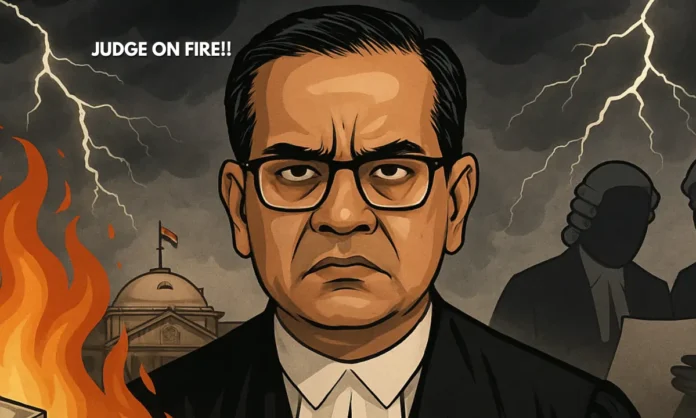Summary
- Allahabad HC Judge Justice Yashwant Varma has moved the Supreme Court against an in-house panel report recommending his impeachment.
- The controversy stems from the alleged recovery of a large amount of cash at his Delhi residence in March.
- The Centre is likely to table an impeachment motion in the Monsoon session of Parliament starting July 21.
The Judge vs. The Judiciary: A Historic Showdown
A looming constitutional storm has engulfed India’s judicial corridors, with Allahabad High Court Judge Justice Yashwant Varma challenging the in-house inquiry report that recommended his impeachment. The controversy began after a fire at his Lutyens Delhi residence on March 14 allegedly led to the discovery of a large sum of cash—a claim Varma vehemently denies.
The judge, currently stripped of judicial responsibilities, has petitioned the Supreme Court, arguing that the three-member panel, set up by former Chief Justice of India Sanjiv Khanna, reached conclusions without providing him with a “full and fair hearing.” With Parliament’s Monsoon session set to begin on July 21, where an impeachment motion is expected to be introduced, the case is shaping into a rare high-stakes confrontation between the judiciary and legislative authority.
Justice Yashwant Varma late last night moved the Supreme Court, challenging the in-house panel report that has indicted him
— TIMES NOW (@TimesNow) July 18, 2025
Why did he moved top court?:
– Challenges: CJI's recommendation to remove him.
– Attempt to: Halt the impeachment process in parliament.@harishvnair1… pic.twitter.com/35DLEoRzfP
Cash Discovery and the Inquiry Controversy
- A fire at Justice Varma’s official residence allegedly exposed a cache of unaccounted cash on March 14.
- Delhi HC Chief Justice D.K. Upadhyaya conducted a preliminary probe, leading to suspension of Varma’s judicial duties.
- Justice Varma insists no such cash was ever found or linked to him or his family.
According to official accounts, fire personnel responding to the blaze reported finding bags of cash. This prompted a swift response from the judiciary, including the formation of an inquiry committee by then CJI Khanna. The report—while not publicly released—was shared with President Droupadi Murmu and Prime Minister Narendra Modi last month, reportedly including photographic and video evidence.
Justice Varma’s legal challenge accuses the panel of procedural lapses, stating: “Even if cash was found, ownership and authenticity remain unproven, and I was denied an opportunity to fully present my case.”
Impeachment Motion and Political Dynamics
- The Centre plans to introduce a removal motion in Parliament during the Monsoon session.
- Cross-party support is essential, given the constitutional majority required for judicial impeachment.
- Historically, most judges facing impeachment have resigned before proceedings concluded.
Justice Varma’s case has revived discussions about judicial accountability versus independence. The government is reportedly in talks with opposition parties to ensure bipartisan backing for the motion.
Impeachment of a judge in India requires a two-thirds majority in both Houses of Parliament—a threshold that has made such proceedings exceedingly rare. So far, only a handful of judges have faced impeachment motions, with resignations usually preempting a full parliamentary trial.
Judicial Integrity and Public Confidence
- The case highlights gaps in transparency regarding judicial misconduct probes.
- Public opinion remains divided, with some calling for stricter checks on judicial ethics.
- Legal experts warn that politicizing impeachment risks undermining the independence of courts.
This case comes at a time when the judiciary’s image is under heightened scrutiny. While the in-house process is designed to safeguard independence, critics argue that secrecy and selective leaks only deepen public mistrust.
Justice Varma’s challenge could set a precedent for how judges facing allegations interact with constitutional oversight mechanisms. If the impeachment motion proceeds, it may be one of the most closely watched events in recent parliamentary history.
The Road Ahead: Judicial Reckoning or Political Showdown?
The Justice Yashwant Varma controversy is now more than just an internal judicial matter; it has evolved into a litmus test for how India balances judicial integrity with constitutional procedure. By challenging the Supreme Court panel’s findings, Varma is asserting his right to due process and transparency—a move that could either expose procedural gaps or further entrench the allegations against him.
The upcoming Monsoon session of Parliament, where his impeachment motion may be tabled, will determine not just his future but also the robustness of India’s mechanisms for holding judges accountable. With cross-party consensus still uncertain and public opinion divided, the case may well shape the narrative on judicial reforms for years to come.
Whether Justice Varma is exonerated or removed, this episode has already reignited a national debate: should the judiciary’s internal processes remain behind closed doors, or does public trust demand a more open reckoning?


